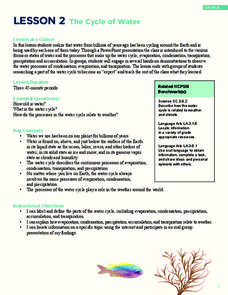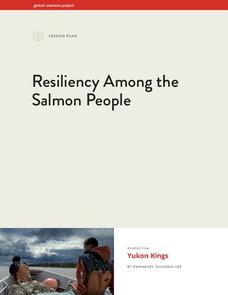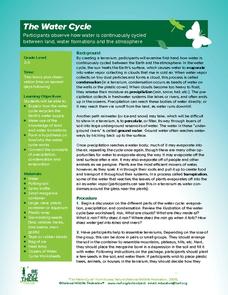Curated OER
National Marine Sanctuaries Shipwrecks
Junior oceanographers access the Channel Islands National Marine Sanctuary Shipwreck Database and plot the locations of several shipwrecks. Shipwrecks are always an enthralling subject and this activity allows your learners to act as...
K12 Reader
Water Cycle
solid, liquid, and gas. The three different forms of water are the subject of the article used to assess reading comprehension. After reading the article, kids respond to a series of comprehension questions based on the text.
Curated OER
The Gender of Nouns
A great handout for middle-schoolers learning nouns and their genders, this resource is comprehensive and easy to read. Consider providing some practice opportunities for your learners while you review the information.
Curated OER
Prepositions Can Show Positions in Space
Answer the questions where and when with this handy prepositions worksheet. Twelve questions contain prepositional phrases for your class to find and label; the first one is completed as an example. The resource includes an answer key on...
Worksheet Web
Let it Snow
After reading an informational text detailing the ins and outs of snowflakes, scholars draw their own special design then work cooperatively to role play a snowman building scenario.
Japan Society
Nature and the Environment in Postwar Japan
Japan has a complex relationship with the environment. Explore this relationship with your class through this resource. Included are thought questions, several activity ideas that range from writing, to discussion, to research, and an...
Curated OER
Animal Farm Chapter 2 Discussion Notes and Mini-Project
Imagine having the opportunity to create your own country. After responding to questions about chapter two, readers of George Orwell's dystopian classic are given a chance to design a utopia for one-million people, complete with...
Indian Land Tenure Foundation
Relationships to Places
Young historians take a look at how the Indian tribes of California promoted a mindful relationship between people and the land. They begin to understand how the Indians were champions of conservation, and at preserving the natural...
California Academy of Science
Carbon Cycle Role Play
Anytime you make concepts clear with role playing or hands-on experience, it's a win for the whole class. Ping-Pong balls are used to represent carbon in a carbon cycle role-play activity. In small groups, children first discuss what...
University of Wisconsin
Sizing a Rain Garden
Most appropriate if you are applying the entire unit to build a rain garden at your school, this installment involves calculating the area that will drain into it. Your garden planners will need data from previous lessons, so this one...
Tennessee Valley Authority
Renewable Energy Sources
Not all energy sources are renewable, as learners investigate in this unit. Made up of six lessons that span a few weeks of instruction, the unit has learners examining US energy reserves and consumption, using data to draw conclusions...
Ask a Biologist
It’s a Plankton Eat Plankton World
For as small as they are, plankton sure play an enormous role in maintaining marine ecosystems. Dive into an investigation of these tiny organisms with a hands-on life science activity in which children cut out pictures of sea...
San Francisco Public Utilities Commission
Let's Save Water: Water Conservation
Did you know that cutting down your shower by one minute a day can save five gallons of water? Learn about water conservation with a science reading activity. After kids finish reading key terms and water-saving tips in a reading...
Mathematics Vision Project
Module 5: Features of Functions
The language and features of functions get careful treatment in a complex but doable lesson. Learners get a lot of practice really figuring out what a graph means in context, and also identifying key features of graphs. Key ideas...
NOAA
The Cycle of Water
Young water cycle enthusiasts discover the water they have been using has been cycling around the earth for billions of years. Through presentations, learners will understand that water has three states and how these forms...
Teach Engineering
Red Cabbage Chemistry
Using the natural pH indicator of red cabbage juice, groups determine the pH of different everyday liquids. As they work, pupils gain an understanding of pH that may help deal with contaminants in the water supply.
NOAA
Deep-Sea Ecosystems – Chemosynthesis for the Classroom
Photosynthesis was discovered in the 1770s, but chemosynthesis wasn't discovered until 1977. While many have performed an experiment to show how photosynthesis works, the activity allows pupils to observe chemosynthesis. Scholars set up...
Global Oneness Project
Resiliency Among the Salmon People
Is losing cultural traditions the cost of social progress, or should people make stronger efforts to preserve these traditions? High schoolers watch a short film about the native Yup'ik people in Alaska and how they handle the shifts in...
National Institute of Open Schooling
Heavy Metal Contamination
An informative lesson focuses on heavy metal contamination of environments. Classes read about, discuss, and answer questions pertaining to sources of heavy metals in the environment. To finish the 35th installment of 36, individuals...
Shakespeare Globe Trust
Fact Sheet: The Third Globe
Hopefully the third time's a charm when it comes to rebuilding London's Globe Theatre! With an informational text, readers learn about the reconstruction of the theatre in the 1990s. They also discover how modern health and safety...
Pearson
Langston Hughes
An author study provides learners the opportunity to explore in depth the life of, the influences on, and the works of a single literary figure. Introduce middle schoolers to Langston Hughes with a unit that models how to approach an...
Poetry4kids
How to Write an Exaggeration Poem
The best poetry writing lesson of all time is here for you! Learn all about the art of exaggeration with a lesson on exaggeration poems, which instructs students to use wild imagery to convey their message.
Describing Egypt
Temple of Isis (Philae)
How did the Temple of Isis change throughout history? The resource discusses how architecture changed purposes over the time periods of the Pharaonic Era and the Greco-Roman Era. It gives a glimpse into what life was like and provides...
Curated OER
The Water Cycle
Students are introduced to the components and importance of the water cycle. They are shown how groundwater moves using a model. Students list 9 places on earth where water is found. They define the terms cycle and water cycle.
Other popular searches
- About Rivers and Lakes
- Rivers and Lakes Geography
- Lakes and Rivers
- Rivers Lakes Streams
- Rivers, Lakes, Streams
- Usa Lakes and Rivers

























